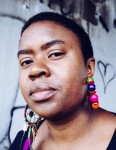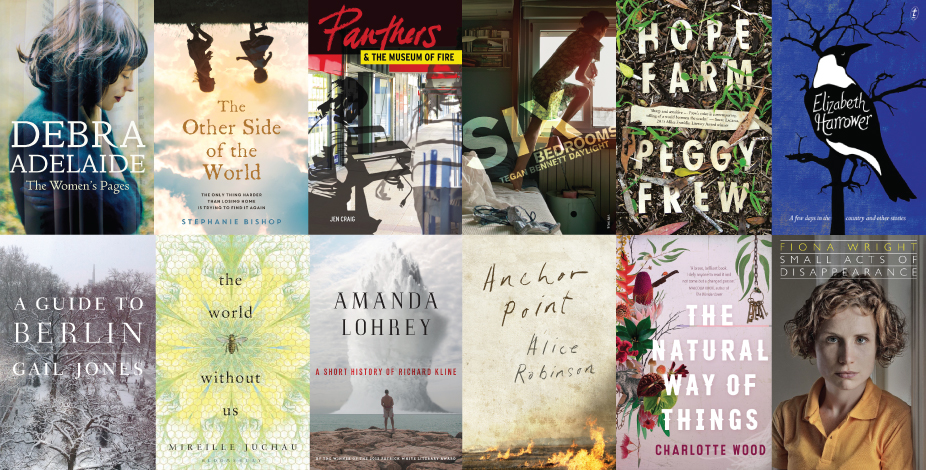Novels and collections of short stories including work by Elizabeth Harrower, Charlotte Wood and Amanda Lohrey dominate the long list $50,000 annual Stella Prize which celebrates great books, fiction and non-fiction, by female Australian authors. The only non-fiction book to make the list is Small Acts of Disappearance : Essays on Hunger by Fiona Wright. The full long list is:
Byron Bay Writers Festival program for 2015 released
Emily Bitto whose The Strays won this year’s Stella Prize, Joan London, Kate Greville and Chigozie Obioma are among the headline writers appearing at the 2015 Byron Bay Writers Festival which is running 7-9 August. The program for the festival, which is held on a beautiful site just a stone’s throw from the ocean…
Helen Garner, Joan London and Sophie Cunningham on shortlist for $30,000 Kibble Award
 Some of the finest writing this year is showcased in the shortlist for the
Some of the finest writing this year is showcased in the shortlist for the Kibble Literary Award for established authors and the Dobbie Literary Award for a debut published author, both just announced. The shortlisted authors for the Dobbie, which carries a $30,000 prize are: Sophie Cunningham for Warning: The Story of Cyclone Tracy (Text Publishing), Helen Garner, This House of Grief (Text Publishing) and Joan London (left), The Golden Age (Vintage Australia). The shortlist for the Dobbie Literary Award which has a $5,000 prize are Emily Bitto The Strays (Affirm Press); Ellen van Neerven (right) for Heat and Light (University of Queensland Press) and Christine Piper After Darkness (Allen & Unwin).
Kibble Literary Award for established authors and the Dobbie Literary Award for a debut published author, both just announced. The shortlisted authors for the Dobbie, which carries a $30,000 prize are: Sophie Cunningham for Warning: The Story of Cyclone Tracy (Text Publishing), Helen Garner, This House of Grief (Text Publishing) and Joan London (left), The Golden Age (Vintage Australia). The shortlist for the Dobbie Literary Award which has a $5,000 prize are Emily Bitto The Strays (Affirm Press); Ellen van Neerven (right) for Heat and Light (University of Queensland Press) and Christine Piper After Darkness (Allen & Unwin).
Women dominate shortlist for Australia’s Miles Franklin Literary Award
Women writers dominate the short list for the Miles Franklin, one of Australia’s most prestigious awards which was announced tonight. Only one man, Craig Sherborne, who wrote Tree Palace, made it through. The short list for the $60,000 prize which celebrates “Australian life in all its glories” is:
- Golden Boys by Sonya Hartnett, Penguin.
- The Eye of the Sheep by Sofie Laguna, Allen & Unwin (reviewed here).
- The Golden Age by Joan London, Random House.
- After Darkness by Christine Piper, Allen & Unwin.
- Tree Palace by Craig Sherborne Text Publishing.
The judges’ spokesman, Richard Neville, said the shortlisted novels had “a rich cast of unforgettable characters, and themes ranging from childhood
Counting the days to Sydney Writers Festival
 As with travel, a great deal of the pleasure of book festivals lies in the planning. Hours can be whiled away pouring over brochures or web sites, drawing up timelines and bemoaning a clash of favorites. And as the almost final decisions take place there is that delightful frisson of anticipated pleasure followed by a flurry of preparatory reading.
As with travel, a great deal of the pleasure of book festivals lies in the planning. Hours can be whiled away pouring over brochures or web sites, drawing up timelines and bemoaning a clash of favorites. And as the almost final decisions take place there is that delightful frisson of anticipated pleasure followed by a flurry of preparatory reading.
Sydney Writers Festival, which kicks off next week, has grown from a rather modest, largely parochial affair, to a weeklong extravaganza with such variety of offerings that have earned it an international reputation. Although there are sessions spread around the city the main venue is the Walsh Bay precinct with its awesome outlook over Sydney Harbour. There is a constellation of internationally recognised guests from Australia and
Stella Prize finalists reveal the inspiration behind their books
Joan London (right) wanted to write about the 1950s, “the time of her childhood.” Emily Biffo wanted to write about a group of people attempting to separate themselves from mainstream culture. And Elen Van Neervan wanted to ask questions about Indigenous governance in Australia, and issues like land rights, identity and love. Each of the six finalists for the Stella Prize for Fiction, the winner of which will be announced next week, has explained the inspiration behind their shortlisted books in a series of revealing interviews with The Guardian.
wanted to write about a group of people attempting to separate themselves from mainstream culture. And Elen Van Neervan wanted to ask questions about Indigenous governance in Australia, and issues like land rights, identity and love. Each of the six finalists for the Stella Prize for Fiction, the winner of which will be announced next week, has explained the inspiration behind their shortlisted books in a series of revealing interviews with The Guardian.
Maxine Beneba Clark whose collection of short stories Foreign Soil is published by Hachette, said she was looking at “people trying to find a place for themselves in the world – about the search for a true place to call home, about the things we gain when we migrate, and the all-consuming heartache of our leaving, even as we find the very things we’re looking for”.
Hachette, said she was looking at “people trying to find a place for themselves in the world – about the search for a true place to call home, about the things we gain when we migrate, and the all-consuming heartache of our leaving, even as we find the very things we’re looking for”.
2015 Australian Book Industry Awards finalists announced
Australian literary heavyweights Joan London, Liane Moriarty, Peter Carey and Helen Garner are all included in the shortlists for the 2015 Australian Book Industry Association awards announced today. There are 11 categories this year including two new ones specifically targeting small publishers.
The full list is:
Longlist for Miles Franklin Award 2015 announced
Eight women have made the long list for the long list of the Miles Franklin Award for $60,000 prize for Australian Literature won last year by Evie Wyld’s evocative All the Birds, Singing. The shortlist will be announced on 18 May with the eventual winner named on 23 June. The…
Stella Prize shortlists six of the best in writing by Australian women
Journalist and author Christine Keneally is the only non-fiction author to make it onto the shortlist of Australia’s prestigious The Stella Prize for women writers announced today. Her The Invisible History of the Human Race looks at the role of DNA in shaping us, and our world.
The other five finalists are:
- Joan London’s The Golden Age (Random House)
- Emily Bitto’s The Strays (Affirm Press)
- Ellen van Neerven’s Heat and Light (UQP) ,
- Sofie Laguna’s The Eye of the Sheep (Allen & Unwin)
- Maxine Beneba Clarke’s Foreign Soil (Hachette)
In announcing the shortlist, Stella Prize executive director Aviva Tuffield said: “These six remarkable books explore themes of identity, family, displacement and belonging, with distinctly Australian resonances.’’ The winner will be announced on Tuesday 21 April. Previous recipients of the prize are Carrie Tiffany’s Mateship with Birds (2013) and Clare Wright for The Forgotten Rebels of Eureka (2014).
Below is the Stella Award’s synopsis of each of the finalists.
Longlist for Australia’s Stella Prize celebrating women authors, is announced
Joan London’s poignant The Golden Age and The House of Grief, Helen Gardner’s harrowing reportage of a crime that shocked the world, are standouts on the longlist for Australia’s prestigious $50,000 Stella Prize, which celebrates women authors, and which was announced yesterday. The longlist for the Prize, which was first awarded in 2013, also includes three debut writers.
Full long list is:

